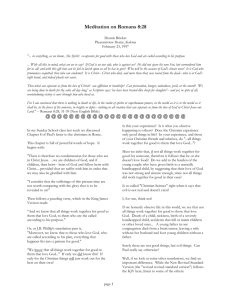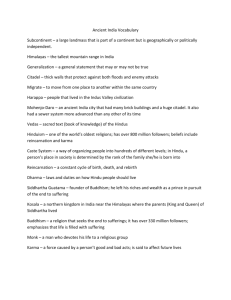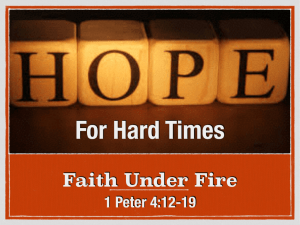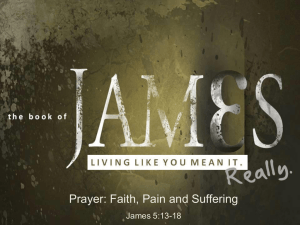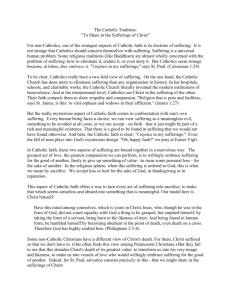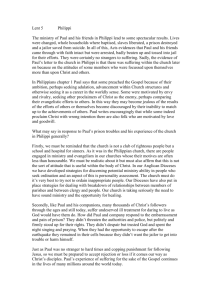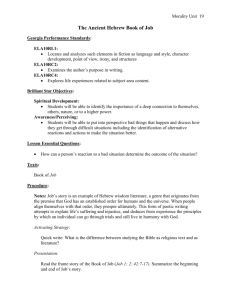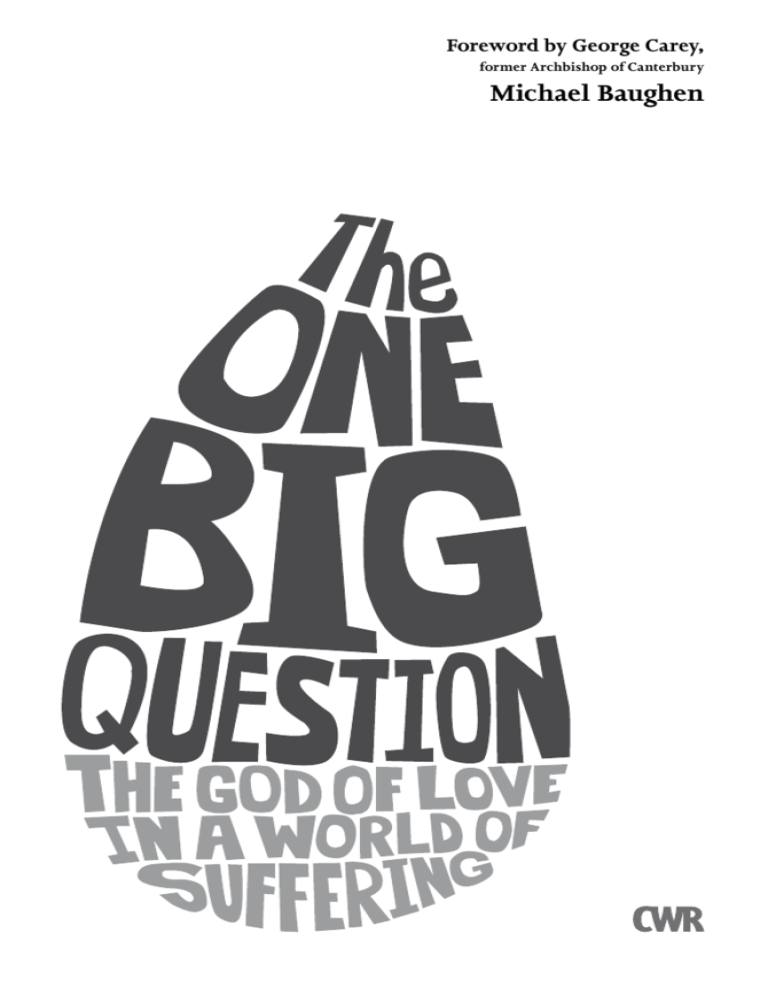
Foreword by George Carey,
former Archbishop of Canterbury
Michael Baughen
Contents
Acknowledgements
5
Foreword by Lord Carey, former Archbishop of Canterbury
7
Why? How? An introduction
9
Section A: Why? Questioning the God of love
15
1 Why is there suffering if there is a God of love?
17
2 Why doesn’t God stop all suffering, if He is omnipotent?
25
3 Why doesn’t God stop all wars, crimes and evil?
31
4 Why is there injustice if God is a God of justice?
37
5 Why has this happened to me – what have I done to deserve this?
47
6 Why doesn’t God prevent ‘natural’ disasters?
51
7 Why doesn’t God stop all illness and disease?
59
Section B: How? Knowing the God of love
65
8 The transforming relationship with the God of love
67
9 Strengthening faith in God as God 71
For a list of National Distributors visit CWR’s website: www.cwr.org.uk
10 Deepening in assurance of the love of God
79
Unless otherwise indicated, all Scripture references are from the Holy Bible: New
International Version (NIV), copyright © 1973, 1978, 1984 by the International Bible Society.
11 Increasing in hope as an anchor for the soul
89
Other versions used:
12 The turning to a purpose
99
Copyright © 2010 Michael Baughen
Published 2010 by CWR, Waverley Abbey House, Waverley Lane, Farnham,
Surrey GU9 8EP England. CWR is a Registered Charity – Number 294387
and a Limited Company registered in England – Registration Number 1990308.
The right of Michael Baughen to be identied as the author of this work has been
asserted by him in accordance with the Copyright, Designs and Patents Act 1988.
All rights reserved. No part of this publication may be reproduced, stored in a
retrieval system, or transmitted, in any form or by any means, electronic, mechanical,
photocopying, recording or otherwise, without the prior permission in writing of CWR.
GNB: Good News Bible © 1996,1971,1976 American Bible Society
Phillips: J.B. Phillips, The New Testament in Modern English, © 1960, 1972, J.B. Phillips,
Fount Paperbacks.
NRSV: New Revised Standard Version, © 1989, Division of Christian Education of the
National Council of the Churches of Christ in the United States of America
TNIV: Scripture taken from the Holy Bible, Today’s New International Version®.
Copyright © 2001, 2005 by Biblica®. Used by permission of Biblica®.
All rights reserved worldwide.
Concept development, editing, design and production by CWR
Cover image: CWR
Printed in UK by CPI
ISBN: 978-1-85345-572-8
13 The theatre of God’s power and grace
105
14 The touch of care
111
15 The trust of prayer
119
16 Lord, take it away from me
125
17 Sufcient grace; complete power
133
Acknowledgements
My biggest gratitude is to my wife, Myrtle: for her deep faith and love,
the example of her life, her personal handling of suffering, her strong
encouragement to me to write this book, and her patient support
throughout the whole process, as well as being a very perceptive
reader of the script. My thanks, too, to our family for their loving
support – Graham and Rachel, Phil and Liz, Andrew and Rachel – in
this, and always.
My thanks next to CWR who asked to publish this book, and to the
whole CWR team, especially Lynette Brooks (Director of Publishing),
Sue Wavre (Senior Editor), Sheila Jacobs (editing), June Bradley
(copyrights). Everyone has acted with gracious professionalism and
warm Christian encouragement
I hesitated to ask Archbishop George Carey whether he would
write a foreword but, when I did, he responded with alacrity and
enthusiasm. The foreword he has written is masterly, with its
theological depth and its compassionate understanding, all arising
from rst-hand experience across the world, and in his own family. I
am most grateful to him.
Fiona Castle is an inspiring speaker and witness for Christ and
has shown how the sad death of her fine husband Roy from cancer
has not soured her faith but rather deepened it. I was touched by her
kindness in agreeing to read the book and much appreciate her warm
and thoughtful commendation.
So many others have generously and kindly allowed me to quote
from their writings or speaking, and several have written specially
for this book from their suffering, particularly Bob Mortimer, Mel
Menzies, the Very Revd John Benson and the Revd Sharon GrenhamToze. Conversations with the Revd Dr John Stott have been much
appreciated. The Revd Michael Wenham, Abigail Witchalls, Celia
Harding and Ruth Caiger have most kindly responded. I have expressed
my thanks to them in the notes at the end of each chapter. I have been
5
T he one big question
touched that scientists as well as theologians have taken trouble to
correspond, to advise on and to check material. Dr Colin Connolly
went more than the extra mile for me, and I am much in his debt.
Michael Buerk also kindly corresponded with me.
I appreciated the offer from Leslie Roberts to edit the rst draft
of the manuscript, and he took much care on it; Frances MacKenneyJeffs also helped considerably from her own research by supplying
information on a wide variety of books on this theme, and in sharing
her own pilgrimage; Judge David Turner, QC and Judge Diana Faber
gave thoughtful reflections on justice (but I alone am responsible for
what I have written!); Dr Ian Cunliffe advised medically; Elizabeth
Baughen advised on counselling; Sheila Lonsdale paid close attention
to the reading of the manuscript, and gave many comments; Margaret
Mortimer generously allowed me to include Bob’s contributions to the
book, even though his earthly life ended last year; she also read the
manuscript, as did Graham Sopp, Rachel Baughen and Sandra Pronger.
I am most grateful to them all. My thanks, too, to the congregations
of St James, Clerkenwell and St Saviours, Guildford who received a
series of sermons from me on this theme and responded helpfully
with comments and questions, as well as sharing personal experiences
of suffering.
The example of so many who have turned personal suffering
into a ‘theatre of grace’ has been much of a stimulus for this book –
but, most of all, it sprang from the desire that all who have faith in
Christ will more fully be able to join with Paul and say from the heart:
‘Praise be to the God and Father of our Lord Jesus Christ, the Father
of compassion and the God of all comfort, who comforts us in all our
troubles’ (2 Cor. 1:3–4).
Michael Baughen, June 2010.
6
Foreword
There can be little doubt that the problem of pain with the bundle of
issues that accompany it forms the most grievous obstacle to believing
in God. Following the First World War, Raymond Asquith, son of the
then prime minister, wrote bitterly, ‘A blind God stomps around the
globe with a pair of sensitively malevolent antennae seeking what
deserves to live and using iron hooves to grind it to dust’. So it might
seem at times.
It therefore takes a very bold writer to tackle this problem head
on with intelligence, compassion and without minimising the extent
of the difculties for Christian belief. Bishop Michael Baughen brings
to this task his rich experience as a Christian minister, and his years
of thinking around this most contentious of subjects. He deals with
the subject with sensitivity and much understanding. He brings
out the fact that if the problem of pain and inexplicable suffering
challenges the person of faith, so does the problem of good for those
who reject, out of hand, the idea of a good God. If purposelessness
and randomness reign in our universe, where do goodness, justice,
sacrice come from? Why is that in spite of the most terrible things
happening to people of faith, they refuse to believe in futility?
Perhaps one of the most terrible incidents that came the way of
my wife and I was in early 1995 when we were among the very rst
Westerners to visit Rwanda. We flew to a Roman Catholic cathedral
some miles from Kigali where 5,000 women and children had been
murdered. The bones of the people were still there in and around
the cathedral. Our eyes stung with tears as we imagined the people
pleading for mercy, in vain. But the people we met refused to conclude
that a blind God deliberately allowed this terrible act to happen.
Rather, they insisted that man’s sin and evil was the originating cause.
From that awful event so many good things have emerged with people
on both sides of the conflict determined to create a new society.
However, we must be frank, as Michael Baughen is, that there is no
7
T he one big question
one simple answer that can satisfy the mind searching for answers to
what theologians call divine justice (theodicy). That surely should not
surprise us because if God is anything, He is greater than our minds
can comprehend or even imagine. The heart of Christian teaching is,
however, that we can know Him through Jesus Christ and we may
grasp His purposes through intelligent faith.
As the writer shows, Christians are not left to live as orphans with
questions only. A real faith opens the door to a new and exciting
relationship with Christ: a relationship that gives strength and
courage to face each day with hope and wonder. This book encourages
Christians who are living with suffering to know more of God’s
strength even in weakness. I am glad it is full of stories of Christians
who have faced pain and death with courage and faith, because that
is the living reality of what faith actually means. Years ago I recall
visiting a parishioner in Durham who was dying of cancer. I must have
looked very miserable because the lady looked up at me and said with
a big smile on her face: ‘Why are you looking so miserable, vicar. I’m
only dying, you know!’ Some thirty years on I still remember those
words as though they were minted yesterday. ‘I’m only dying, you
know’ is a statement by a Christian who knows that this life, though
it must not be scorned, is but the gateway to a glorious kingdom that
God has prepared for those who love Him.
We are in Bishop Michael Baughen’s debt with this powerful and
stimulating book. He is not afraid to face head-on this most intractable
of problems without falling into glibness or facile explanations. The
truth is that we cannot adequately explain suffering and evil. There is
only one possible answer to the question: ‘Why does God allow such
evil?’ and it lies in the fact that God Himself is involved in the pain,
the suffering and the evil and the ultimate heart of it is the cross of
Christ. Only with God’s total identication with human suffering can
the moral accusation be removed. And what a wonderful destiny that
gives to all of us who follow that cross.
George Carey
Archbishop of Canterbury, 1991–2002
8
Why? How? An introduction
Why? Why? Why?
‘Why?’ is a question that never seems to go away with respect
to suffering:
‘Why has this happened to me?’
‘Why does a God of love allow suffering?’
‘Why is it that the evildoers seem to succeed and the good do not? I
thought God was a God of justice.’
‘Why does God allow natural disasters like tsunamis?’
‘Why doesn’t God stop earthquakes?’
‘Why doesn’t God stop all the wars and conflicts in the world?’
‘Why does God allow so many Christians to be persecuted, evicted
from their homes and even murdered because of their faith?’
As I stood on an Underground platform waiting for my train, I noticed
a girl jigging to the music coming through her earphones. Her mother
was asking her a question. The jigging went on. The mother raised
her voice. The jigging went on. It was only when the mother shouted
loudly and the crowd on the platform moved forward to join in the
shouting that the girl became aware of what was happening and
took off her earphones. Only when the block was removed could she hear
anything other than her own music.
The biggest block against facing up to ‘real’ Christianity is
suffering. It is like those earphones. Gospel truth may be explained,
emphasised and made as clear as possible, but, if there is a block
caused by the issue of God and suffering, there is unlikely to be any
response. For many people, the block is like steel shutters that form an
almost impenetrable barrier to faith.
This block is so often hidden by a smokescreen of intellectual
argument. I think of a person who had held a high position. When
we rst met, his arguments against Christianity were all intellectual.
9
T he one big question
Professor Dawkins was a star and his views were accepted without
question. Then, when that star faded, the argument was changed from
atheism to agnosticism, largely based on John Humphrys’ tenets in
his book In God We Doubt.1 The Darwinian celebration came next, and
evolution became the ground of discussion. Yet, even then, I was able
to draw on brilliant books by Christians in that eld which convinced
him it was still possible to believe in God. Eventually, however,
the debate stalled. I discovered that the real block was the issue of
suffering, and sadly all discussion on this was refused as being ‘too
hurtful a memory to discuss’. Emotional involvement in suffering had
overwhelmed intellect.
Charles Darwin did not, apparently, lose his faith in God because
of his theories, but mainly because of his personal sufferings, in
particular the death of his young daughter.
C.S. Lewis, who had previously been able to think through the
problem of pain so thoroughly and brilliantly, became so overwhelmed
by emotion at the death of his wife that he only slowly found his way
out of it, as he so powerfully described in A Grief Observed.2
And when a ne Christian leader and good friend of mine lost his
young wife, he commented, bitterly, ‘Prayer is a lottery.’
Even for those with the deepest faith, sadness and the sense of loss
can flood the soul and bring a sense of God-forsakenness.
Sadly, some Christians, who think they know all the answers when
it comes to suffering, quickly turn their backs on God when tragedy
strikes them personally, crying out angrily ‘But it wasn’t supposed to
happen to me!’
For some people, it is not so much personal suffering, but the vast
amounts of suffering in the world at large, such as poverty, hunger,
persecution and homelessness, which put their faith in a Sovereign
Deity in doubt.
Young people, for example, are often deeply moved when on their
gap years they encounter extreme pain and suffering in war-torn or
famine-ravaged parts of Africa and Asia, and nd the contrast with
their own privileged upbringings almost too much to bear. Their
comfortable faith in God is challenged, even shattered.
10
W h y ? H ow ? A n introduction
Visitors to Holocaust sites, seeing the stark evidence of the
horrendous inequalities and evil in the world, raise poignant questions
about justice and mercy, about God and suffering.
In the affluent West, many Christians would say they have a
comfortable life most of the time. Their faith is well-nurtured. They
experience fellowship with one another. They believe that, as long
as they pray regularly and take an active part in the life of their local
church, everything will be all right. But then comes the unexpected
… plans for a wedding are shattered by the unfaithfulness of the
person they were going to marry; their ‘safe’ job becomes redundant
overnight; a loved one is struck down with a debilitating illness.
Until this point, the question of suffering has only been considered
occasionally. No thought-through convictions have been established. It
has been too easy to take Romans 8:28 out of context and assume that
all things will work together for their personal good if they love God,
and that life will be a ‘bed of roses’.
The aim of Section A in this book is to try to tackle a number of
the questions thrown at Christians about suffering. The hope is that
those turned off from God will read and at least consider the responses
that are suggested (there will only be full answers in heaven). It is
also hoped that believers in the Lord Jesus Christ can become better
equipped not only to deal with their own tragedies, but to be able
to give informed responses when genuine seekers, whether agnostics
and atheists, ask them ‘But why?’
When a block in a water pipe is removed, the flow of water
starts with a sudden and powerful force. This is often the case when
the ‘suffering block’ is exposed and moved. There often comes an
immediate receptivity to Scripture and the gospel. But rst, the block
has to be removed!
How? How? How?
The Bible supplies no thorough solution to the problem of
evil, whether ‘natural’ evil or ‘moral’, that is, whether in the
form of suffering or of sin. Its purpose is more practical than
philosophical. Consequently, although there are references to sin
11
T he one big question
and suffering on virtually every page, its concern is not to explain
their origin but to help us to overcome them. (John Stott)3
So Christians need to know how to prepare for, and handle, suffering.
When we go to a hotel, there are escape procedures detailed on
the bedroom door, and we are advised to see where the escape doors
are situated; when we board an aircraft, we are always told the safety
procedures, the positions of escape doors, how to handle emergency
oxygen supply and how to put on and tie a life jacket. If we listen (do
we?), we will be prepared should need arise.
In a similar way, we need to prepare ourselves to face any
sufferings, trauma or turmoil that may come in our lives so that we do
not collapse if and when they come. The way to prepare is to get our
roots down deep into the great teachings of the Bible about suffering.
We cannot know the detail of the suffering we may have to endure,
but we can establish our principles of response and action. If we have
prayerfully thought things through beforehand, then we will be in a
much better position to cope.
In particular we need, all through life, to go on strengthening the
three main pillars of the Christian life. They are the pillars of faith,
love and hope and, of course, they stand on the rock of Christ. Almost
everything else is built around them, and they are the pillars that need
to withstand anything thrown at them. We look at each of these pillars
and at building them more strongly in Chapters 10, 11 and 12.
The New Testament is full of passages on positive faith, on
endurance, and on turning suffering into a way of glorifying our
Lord. Suffering is seen as a means of spiritual growth and a sphere
of powerful witness. It can be liberating, uplifting and challenging,
and it can transform our thinking, our living … and our suffering!
For me, the discovery of this in the vibrant writings of Paul and other
apostles was a transforming experience, and Paul’s passion for it is
infectious! Yet, when Paul writes in Romans 8:18, ‘I consider that our
present sufferings are not worth comparing with the glory that will
be revealed in us’ his use of the Greek word translated as ‘consider’
indicates that his is a position that has only been arrived at after much
12
W h y ? H ow ? A n introduction
thinking, praying, soul-searching and meditation. It is a position
forged in strength through persecution, imprisonment, exhausting
mission journeys and personal illness. It is tested and proven. It is an
unshakeable conviction – and, by God’s grace, this is the position to
which we all need to come.
Some close Christian friends recently had to handle the shattering
news of the husband’s inoperable cancer. They rocked humanly (there
is no need for a ‘stiff upper lip’ as a Christian – we can cry), but they
did not rock spiritually. Although the treatment he received was the
best, gradually the physical battle was lost. The pain, the disgurement
and the suffering were intense, but faith held. He died in the arms of
Christ. I acted as ‘devil’s advocate’ to his widow as I said, ‘How can
you possibly still believe in a God of love when you have seen such
suffering in your beloved husband, and endured it yourself in walking
this awful path with him?’ She looked at me with amazement: ‘Are you
serious? Abandon faith in the God who has carried us, who has been so
wonderfully with us through these months, whose love has surrounded
us? How could I?’ Because they had thought through the question of
suffering before it had occurred, they had forged their convictions and
faith more deeply in the heat of that suffering. Yes, there were tears.
Yes, there was pain. But there was faith and great glory to God.
The issue of suffering, of course, is inextricably linked with the
important arena of healing. There are many books on healing but few
on suffering, yet everyone in the world experiences suffering and it is
there on page after page of the Scriptures, from honest despair and a
sense of devastation in the Psalms and the Prophets, to glorying in it
for Christ in the New Testament. That is what we will look at in the
second section of the book.
The last three chapters of this book look at the place of prayer
in suffering and for healing. To concentrate on healing and to teach
or imply that suffering is unnecessary for a Christian or is due to a
lack of faith, or is because of some hidden sin, is to leave a trail of
destruction. The Bible teaches both about handling suffering to God’s
glory and about the approach to healing for His glory. We need to
have a theology of both and must keep them in balance to avoid over13
T he one big question
despair on the one hand, or overcondence on the other.
Our suffering in the West needs to be put in context. It is for
many a very deep valley to go through, but the suffering endured
by millions in the areas of the world devastated by conflict, famine
and poverty is in a different dimension. These people are very much
our ‘neighbours’ in this world, and Christian churches are strongly
involved in helping the poor and suffering.
We also have a special concern for our Christian brothers and
sisters in those parts of the world where they nd themselves in the
minority, and where new converts are regularly imprisoned without
trial, stripped, beaten and even murdered. They may be forced out
of their homes because of death threats (as happened to 12,000 souls
in Mosul, Iraq). Their homes and churches may be burnt down (as
happened in Nigeria). They may be burnt to death while taking refuge
inside church (as occurred in India). It is vital that we seek to stand
with them and to help them, as far as possible, with practical and
spiritual support.
Archbishop Benkwashi of Nigeria, speaking at a Christian
gathering in the UK in 2009, told his audience not to fear suffering.
Despite having his house burnt down, his church burnt down, and
being subjected to death threats and to violent attacks on both himself
and his wife, he was able to say that all his suffering had strengthened
both his faith and evangelistic resolve.
A text like 1 Peter 5:9–10 snaps into focus: ‘standing rm in the
faith, because you know that your brothers throughout the world are
undergoing the same kind of sufferings. And the God of all grace, who
called you to his eternal glory in Christ, after you have suffered a little
while, will himself restore you and make you strong, rm and steadfast.’
1
2
3
14
Notes
John Humphrys, In God We Doubt (London: Hodder & Stoughton, 2007).
C.S. Lewis, A Grief Observed, copyright © C.S. Lewis Pte. Limited, 1961.
Extract reprinted by permission.
John R.W. Stott, The Cross of Christ (Leicester: IVP, 1986), p.312.
My thanks to John for allowing me to quote him freely.
Why is there suffering
if there is a God of love?
In the hospital ward the atmosphere was highly charged. A precious
child had just died of meningitis. She had always been a healthy
youngster, but then came the fever, the stiff neck, the vomiting. The
diagnosis and treatment had been too late. Although the family didn’t
go to church other than at Easter and Christmas, they had always
regarded themselves as Christians. And they could still remember
enough of the Bible to know that it speaks of God as love. In their
grief, the heart-cry of accusation came rapidly: ‘How could a God of love
allow our child to die?’
The question is voiced time and time again – when a loved one dies
of cancer, one’s marriage partner, with Alzheimer’s, slides away from
recognising us, an eighteen-year-old has a head-on road crash, a son is
killed by a terrorist bullet while serving in the armed forces, a friend
drops dead with a heart attack, or we ourselves experience physical
suffering, or read about it in other parts of the world. It is a natural
enough question. It springs from agonised hearts. It is often followed
up with, ‘if I loved someone and had the power to stop their suffering
or to meet their need, I would do it. So if God is all-powerful, as well
as being love, then why doesn’t He do the same?’
This accusation against God for allowing, not stopping, suffering
will be taken up in subsequent chapters but, in this chapter, we look
at what is actually meant by ‘a God of love’.
When I was a boy, there was a catchphrase that emanated from a
popular philosopher called C.E.M. Joad1: ‘It depends what you mean by
[such and such].’ We need to say the same now. We need to ask, ‘What
do we mean by love, and by a God of love?’
For some people, this is an attractive phrase they picked up in a
17
T he one big question
school assembly or some other brief encounter with Christianity. God
is looked on as a divine grandfather with a kind face and a pocketful of
goodies, who is there to sort everything out for us, who does His best
to intervene when we are in trouble, and who will do what we ask.
Others feel that God is there to be used, to get what they can out
of Him, and to be dispensed with when He doesn’t deliver. Some may
even attend church ‘religiously’ every week, but they see it merely
as an insurance policy to keep on the right side of His divine wrath.
Others disregard Him, make fun of Him, or have some vague, distant
notion of a ‘higher power’ or ‘mysterious cosmic entity’. God is
treated like one of the Emergency Services … called on immediately
when there is a problem, but happily ignored at all other times. When
people say they have lost their faith in God, I tell them I am delighted
because the quicker they get rid of their false idea of a god, the quicker
they can begin to nd the true God.
Ironically, while they expect God to respond because He is a ‘God
of love’, there is no thought of returning that love. Yet this would be an
amazing presumption in human relationships, and we are talking here
of Almighty God!
All these pictures of God have little to do with what the Bible
says about getting close to Him, learning about Him, knowing Him
personally, and being in a relationship of love and worship with Him.
The breakdown of a love relationship can cause immense pain.
For instance, we may have a renegade son who throws back in our
face all the love, kindness and provision we have showered on him
as he grows up. He rejects us, our values, our way of life … but most
of all, he rejects our love. Though we may be able to go on loving
him, we may need to refuse to do anything he wants, or to give him
anything he wants, because he is just using us and does not love us.
The relationship is broken and abused.
The same breakdown in relationship can happen between us and
God. The story of the prodigal son (Luke 15:11–32) shows us God’s
attitude when we become renegade sons and daughters. The son takes
his inheritance and turns his back on the father but, even though
his riotous living eventually leaves him friendless and in poverty,
18
W h y is there suffering if there is a G od of love ?
the father does not intervene. While the father never ceases to love
him, he knows that if he sends his son more money, it will only be
misused and this will achieve nothing. The experience of deprivation
and suffering (for which the father was, of course, not responsible)
actually brings the son to his senses, and he sees where true love and
value lie. This was not the purpose of his suffering, but it helped him
face up to life and its values (as it often does, even when the suffering
is not our fault) and, especially, it made him turn back to the father.
When the son turns back with repentance in his heart, the father runs
to meet him (The only time in the Bible that God is in a hurry!).
As an anonymous person once said: ‘Suffering is not a question
that demands an answer; it is not a problem that demands a solution;
it is a mystery which demands a presence.’
From the very beginning, God’s intention has been to be in a
relationship with us. Genesis 2–3 records how this was thrown
away by our rebellion. Yet God did not give up on us. Ever since,
He has persisted and has gone to extremes to make it possible for
us to be forgiven and restored into a relationship with Him – ‘God
demonstrates his own love for us in this: While we were still sinners,
Christ died for us’ (Rom. 5:8).
*
*
*
*
*
So, when we come into a living relationship with the Lord Jesus Christ,
does that mean that everything changes for us, including suffering?
The answer is both ‘No’ and ‘Yes’!
‘No’, because suffering is part of the fallen world in which we live,
and we are all affected by it and by sin, by the use and abuse of free
will, by injustice, wars, illnesses and physical mortality. D.A. Carson
describes suffering as ‘the effluent of the fall’.2 Those who are restored
into a living relationship with God do not get removed from this
fallen world until death, like every other human being, and we are not
meanwhile placed in some divine cocoon protecting us from all diseases
and accidents. We share, like everyone else, in what Paul calls this
‘groaning creation’ (see Rom. 8:22). Although we have the rst fruits
19
T he one big question
of the Spirit, we ‘groan inwardly as we wait eagerly for our adoption as
sons, the redemption of our bodies’ (Rom. 8:23). That will be in a new
heaven and new earth where pain and suffering are no more.
‘Yes’, because although we share life and its sufferings like anyone
else, we do so with God’s steadfast love surrounding us. That is the
huge difference. Everything is transformed by that love – our faith, our
attitude to suffering, and our handling of it for God’s glory. Most of all
it means that, whatever we face, God is with us. This is what the ‘love
of God’ means to us in the voyage of life, whether in calm or rough
seas, and especially in the rough seas of suffering.
When Mike Harding, priest,3 was dying of cancer, he described
this relationship as a ‘presence’:
like sitting in front of an open log re on a cold and blustery
winter’s day. And simply enjoying the comfort and security that
the experience provides. The only difference being that in this case
the comfort and security is constant. The re never goes out and
never has to be re-made. This relationship, therefore, takes on
such intensity that it allows no possibility of separation save that
which may be chosen by the individual himself from moment to
moment. The actual process of dying – the gradual loss of bodily
functions and faculties – even the ‘last enemy’ death itself, cannot
thus diminish this relationship by a single degree.
Psalm 23 shows superbly that, although we may know the Lord as our
shepherd in the green pastures and still waters, our relationship with
Him deepens in the testing of the valley of the shadow. The psalmist
begins to speak of the Lord in very personal terms – ‘you are with me’
(italics mine). The valley is not removed, but he nds God holding
him, encouraging him, comforting him (‘your rod and your staff …
comfort me’ in verse 4); he nds that he no longer fears evil (v.4); he
receives special touches of love – a prepared table, an anointing with
oil, even when he is surrounded by his enemies (v.5). The climax of
the psalm shows him realising the depth of God’s goodness and love
that surround him for the whole of life and beyond. Paul expresses
20
W h y is there suffering if there is a G od of love ?
the same truth powerfully in Romans 8:35–37: ‘Who shall separate
us from the love of Christ? Shall trouble or hardship or persecution
or famine or nakedness or danger or sword? … No, in all these things
we are more than conquerors through him who loved us.’
Bob Mortimer was a t and healthy man who climbed mountains
and loved to undertake rugged walks and adventures. He was a
probation ofcer before retirement. He was a ne Christian. When
his cancer was diagnosed, I asked him to write down his experiences,
and he and his wife, Margaret, most kindly agreed that they could be
printed. Extracts of his story appear throughout the book. This is the
rst one:
In February 2006 I was diagnosed with cancer. It came right
out of the blue – I had always prided myself on my health and
tness (I think pride was probably the right word for it!), and I
was quite unprepared for the prospect of serious illness. I went
through the whole gamut of feelings and emotions; disbelief (‘surely
this could not happen to me’), fear and panic. Then came the
admission to hospital and surgery, followed by another blow – the
cancer was aggressive and the prognosis poor. A subsequent course
of radiotherapy left me with feelings of physical and emotional
weakness of a kind I had never experienced before – and I felt
generally at a low ebb. Nevertheless, as the weeks passed I began to
feel stronger, so it was all the more disappointing to learn, following
further scans in October 2007, that the cancer had returned.
People sometimes ask me how I have coped with this rollercoaster journey and I think it is important to emphasise that what
follows is not a testimony to what I have achieved, but to the
faithfulness of God and what I believe He has been trying to teach
me through these experiences. There have been plenty of times
when my faith has faltered, when I have become overwhelmed
with the depressing nature of my immediate circumstances
and have failed to draw on the resources of strength and grace
available through Him. But the Lord has always been there for me
and, not infrequently, at the low points of the journey, something
21
T he one big question
W h y is there suffering if there is a G od of love ?
has occurred to lift my spirits – perhaps a particularly helpful
card or visit from a praying friend, or the impact of a moving
hymn or song – and I have been enabled, once again, to recognise
and experience ‘His strength made perfect in weakness.’ I think
it is true to say therefore, that through all the ups and downs of
the past two years, both Margaret and I have known a remarkable
sense of the presence and peace of God.
*
*
*
*
*
Only through the Scriptures can we understand God as love. We will
not nd this anywhere else. It was C.S. Lewis who said that, when he
was an atheist, it had never occurred to him to ask the question, ‘If
the universe is so bad, or even half so bad, how on earth did human
beings ever come to attribute it to a wise and good Creator?’4 Similarly,
we would ask, ‘How, in a world of so much evil, can humans have
come to believe in a God of love?’ Indeed, when humans create their
own religions they are often prompted by fear. We see it in primitive
offerings to placate imaginary gods who might otherwise hurt us,
destroy us, or stop the fertility of the ground. So many of these ‘gods’
are terrifying. Religions can also put the stress on obeying laws and
performing religious duties, where love is earned but does not exist as
a relationship.
In 1966, Bilquis Sheikh, a high-born Pakistani woman and a
Muslim, came to a living faith in Christ (for which she was ostracised
and threatened with death). When she wrote a book about this, she
entitled it I Dared to Call Him Father.5 It was daring because she had
been brought up to see God as a great God who must be worshipped
and obeyed, but without any idea that a personal relationship with
Him could exist. Christians can often take the Fatherhood of God for
granted, as most of us learn to pray, ‘Our Father …’ from an early age.
Yet, for Bilquis Sheikh, it was thrilling, amazing and overwhelmingly
wonderful to know God in personal relationship as her Father.
This relationship is only possible through Christ. We only learn
this through the Scriptures, but it is not just a truth in our minds; it
22
is also shown to us when we turn to Christ and experience this new
relationship through the Holy Spirit in our hearts and lives –
those who are led by the Spirit of God are sons of God. For you did
not receive a spirit that makes you a slave again to fear, but you
received the Spirit of sonship. And by him we cry, “Abba, Father.”
The Spirit himself testies with our spirit that we are God’s
children. Now if we are children, then we are heirs – heirs of God
and co-heirs with Christ, if indeed we share in his sufferings in
order that we may also share in his glory’ (Rom. 8:14–17).
This passage immediately precedes, and thus prepares us for, the rest
of Romans 8, which confronts suffering.
It is in this love-relationship, as sons and daughters of our heavenly
Father, that the Christian believer is held through all the experiences of
life. Even when we do not understand the ‘why?’ we can put ourselves
into the arms of God’s love.
A text that has meant so much to me, and which I have commended
to many people in their suffering, from Psalm 63:8, is ‘My soul clings
to you’ or, in other translations, ‘I cling to you’ (GNB). The context is
suffering. Earlier in the psalm, the psalmist had spoken of his hunger
for God, his belief that God’s love is better than life, and he had
prayed. By this stage, however, he is only holding on by his ngertips.
But then comes the line ‘your right hand upholds me’ (v.8). A faith that
holds on is our part. The upholding hand is God’s part. Here is love,
unfailing love. God, in His love, is always upholding us. Countless
believers through the centuries have testied to experiencing the truth
of this in their suffering. It is this that transforms everything for the
believer; it is this that confounds the unbeliever.
To conclude this chapter, I want to emphasise that, in considering
love and suffering, we have to bring ourselves back to the cross of
Christ. Suffering is at the centre of God’s love. It is on the cross that
we see God taking on Himself the evil and sin of humanity, with its
pain and suffering and cruelty. Down the centuries, holy people have
seen the sufferings of our Lord on the cross as an example to us in
23
T he one big question
our own sufferings. Frances Young, the Methodist minister, writes in
her moving book about bringing up her severely handicapped child,
‘There could not be any philosophical answer to the problem of evil;
not one is fully satisfactory. The only answer, the only thing that
makes it possible to believe in God at all, is the cross.’6 Similarly, John
Stott, writing on suffering in his great book The Cross of Christ7 says, ‘I
could never believe in God if it were not for the cross.’
We join in everlasting praise that we do not have a God who is
detached, but One who has lived as a human and suffered. It was, says
John 3:16, God’s love for the world that caused Him to send His only
begotten Son into the world. The cost of that love, culminating in
the cross, was huge. Isaiah 53:3, and the following verses, describes it
starkly: ‘He was despised and rejected by men, a man of sorrows, and
familiar with suffering … afflicted … pierced … crushed … wounds
… oppressed … led like a lamb to the slaughter’ (see Isa. 53:1–7). As
1 John 4:10 puts it, ‘This is love: not that we loved God, but that he
loved us and sent his Son as an atoning sacrice for our sins.’ 1
2
3
4
5
6
7
24
NOTES
Professor C.E.M. Joad (1891–1953) was an English philosopher and broadcasting
personality. He popularised philosophy. He became famous through The Brains Trust
on the radio, with Commander A.B. Campbell and Julian Huxley.
D.A. Carson, How Long, O Lord? (Leicester: IVP, 1982), p.48.
Mike Harding. See notes for Chapter 11.
C.S. Lewis, The Problem of Pain, copyright © C.S. Lewis Pte. Limited, 1941.
Extract reprinted by permission.
Bilquis Sheikh with Richard Schneider, I Dared to Call Him Father
(Eastbourne: Kingsway Publications, 1979).
Frances Young, Face to Face (London: Epworth Press, 1985), p.58.
John Stott, The Cross of Christ (Leicester: IVP, 1986), p.335. My thanks to him.
Why doesn’t God
stop all suffering,
if He is omnipotent?
‘If I Ruled the World’ … the original song with that title spoke in
terms of happiness for everyone and the recent rap version wants
everyone to have designer clothes! It has a terric tune and the words
echo human longing, but imagine hearing it in the midst of a bombing
raid, when being made a refugee, when living in fear, when being
told you will be paraplegic for life, or you are given the news that
you have a terminal illness. The reaction might well be, ‘If there is an
all-powerful God, why can’t He be like that, instead of letting us go
through what we are going through?’
Humans have always sensed there must be something better than
the frustrations of life on earth, even though there is also so much to
enjoy and benet from in the world. William Hazlitt said that ‘man is
the only animal that laughs and weeps, for he is the only animal that
is struck with the difference between what things are and what they
ought to be.’1
The Bible view is that this longing is because of ‘The true light that
gives light to everyone’ (John 1:9, TNIV), that is, the light of the Son
of God. Similarly, Ecclesiastes 3:11 says that God has ‘set eternity in the
human heart’ (TNIV). We are restless until we nd our rest in God.
For the believer, who has the foretaste of the Spirit and of heaven, what
is longed for becomes specic, and the longing becomes stronger!
The problem some of us create for ourselves is that we want
heaven now. We’re not interested in the tension between the ‘now’ and
the ‘not yet’. We say we want a world in which God stops all suffering
and evil. If humans behaved as automatons, this would be perfectly
25

